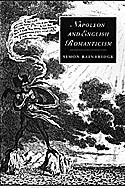
Author: Simon Bainbridge
Pages: 259
Illustrations: 10 black and white plates (all of which are cartoons and illustrations from period newspapers and journals).
Maps: None
Footnotes: 552 (some annotated).
Appendices: None
Bibliography: 73 primary sources and 273 secondary sources.
Index: 568
Publisher: Cambridge University Press, England
Publication Date: 1995
Binding: Coth (hardbound)
ISBN: 0-521-47336-5
Price: $49.95
Summary: Napoleon and English Romanticism, despite its scholarly approach, should be read by anyone interested in widening their understanding of Napoleon's life and times. Simon Bainbridge has succeeded in showing how the figure of Napoleon impacted not only on the governments and states of the time, but also on the great creative minds of the time.
It has been the trend in literary criticism in recent years to study a book or poem--the text--as an isolated creation. Who wrote it, when it was written, and why it was written are bypassed as unimportant asides. The text is considered wholly autonomous.
The English public did not always
fear and loathe Napoleon
In a reversal of that trend, the author of Napoleon and English Romanticism, a professor at the University of Keele, analyzes the texts wholly around who, when, and why it was written. The "why" a particular text was written is explicit in the title: it was written as a response to Napoleon as soldier, politician and man. "Who" wrote the text is also explicit in the title: one of the English Romantic poets wrote it. The "when" a text was written, however, is more problematic and, in turn, has a bearing on the who and why.
The English public did not always fear and loathe Napoleon. Instead, their response to him was dynamic, changing constantly with his changing career. Early in his career, they considered him the savior of the Revolution which, despite the Reign of Terror and the White Terror reaction to it, many people in England still looked upon with qualified hope--though certainly not with the same unequivocal approval with which most had greeted the events of 1789.
The majority of people actually cheered his 1796-97 campaign in Italy as a war of liberation. Some even saw his invasion of Egypt, with his entourage of scientists, historians, and other men of learning, as a quest for enlightenment. His invasion of Switzerland during the Peace of Amiens in 1802, however, turned the English tide of favor against him; even the Whigs who had originally supported him, condemned this act of aggression against what many considered the cradle of liberty in Europe. Finally, when Napoleon crowned himself Emperor in 1804, he lost almost all remaining favor in England.
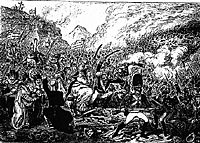 For the last eleven years of Napoleon's prominence, the English, for the most part, viewed him with a mixture of awe, fear and contempt. They feared his threatened invasion in 1805-06, were amazed by his string of victories from 1806 to 1809, awed by his invasion of Russia, and overjoyed by his defeat at Waterloo.
For the last eleven years of Napoleon's prominence, the English, for the most part, viewed him with a mixture of awe, fear and contempt. They feared his threatened invasion in 1805-06, were amazed by his string of victories from 1806 to 1809, awed by his invasion of Russia, and overjoyed by his defeat at Waterloo.
As Bainbridge makes clear, these events affected the poets in England as profoundly as they did the general public--if not more so. Consequently, there is a constant comparison between events in Napoleon's career and specific English poets' creative responses to them throughout the book. In this way, the "when" affected the "who" of a poem. Some poets, like William Wordsworth and Lord Byron, took these events very personally while others, like Samuel Taylor Coleridge of The Rime of the Ancient Mariner fame and Robert Southey, the poet laureate of the time, tried to remain more objective.
Bainbridge notes that Napoleon, for them, was not only a historical figure, but also an "imaginary" figure, a tool or symbol the poets could manipulate to promote their own creative ends. As a historical figure, Napoleon's "genius, energy, imagination and daring" made a Romantic figure whom the poets either adored, as William Hazlitt did, or abhorred, the way John Keats did, who saw Napoleon as a man who "had done more harm to the life of Liberty than anyone else could've done." As an imaginary figure, Bonaparte was recreated in different roles by the different poets. The analysis of Napoleon's presence in these various poetical works makes up the main body of this book.
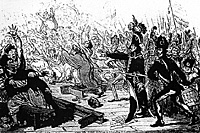 William Wordsworth saw Napoleon as an equal, but dangerous, adversary, who called into question his role as a poet. Napoleon inspired him not only to write some of his greatest poems on the use and power of the imagination, but also compelled him to join the Grasmere Volunteers. To anyone familiar with Words-worth's nature-inspired meditations, it might seem hard to believe that he was so concerned with politics. The author's argument, however, centered around careful analyses of The Prelude and many of the sonnets, more than adequately substantiates his thesis that the poet was, indeed, "obsessed" with Napoleon.
William Wordsworth saw Napoleon as an equal, but dangerous, adversary, who called into question his role as a poet. Napoleon inspired him not only to write some of his greatest poems on the use and power of the imagination, but also compelled him to join the Grasmere Volunteers. To anyone familiar with Words-worth's nature-inspired meditations, it might seem hard to believe that he was so concerned with politics. The author's argument, however, centered around careful analyses of The Prelude and many of the sonnets, more than adequately substantiates his thesis that the poet was, indeed, "obsessed" with Napoleon.
Walter Savage Landor, who looked upon Napoleon as "a mortal man above all mortal praise," imaginatively clothes his hero in an allegorical role in the long narrative poem, Gebir and outlines the ideal state over which he rules in "A Moral Epistle." Only with Napoleon's invasion of Switzerland in 1802 did Landor begin to lose his enthusiasm for the man. Robert Southey also clothes Napoleon in an allegorical guise; but because Southey, unlike Landor's depiction in Gebir, came to abhor Napoleon after initially praising him. In The Curse of Kehama, Southey depicts Napoleon as a "paper tiger" whose "evil is total, but it is not interesting".
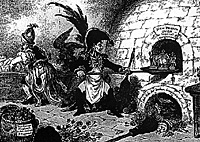 Lord Byron as both man and poet, on the other hand, recreates Napoleon as a failed Shakespearean hero. Initially, he thought him heroic and Prometheus-like; but in the end "he failed to enact the tragic plot implied by Byron's system of fatalism". Instead of dying heroically he abdicates his throne and takes his riches with him into exile at Elba. As Byron himself wrote: "Had he fallen gloriously in battle, had he rushed when he saw he could do nothing to the cannon's mouth, one might have said he was great in the end, but to submit tamely and ask for his treasure proves a soul as mean in his misfortune as it was cruel in prosperity."
Lord Byron as both man and poet, on the other hand, recreates Napoleon as a failed Shakespearean hero. Initially, he thought him heroic and Prometheus-like; but in the end "he failed to enact the tragic plot implied by Byron's system of fatalism". Instead of dying heroically he abdicates his throne and takes his riches with him into exile at Elba. As Byron himself wrote: "Had he fallen gloriously in battle, had he rushed when he saw he could do nothing to the cannon's mouth, one might have said he was great in the end, but to submit tamely and ask for his treasure proves a soul as mean in his misfortune as it was cruel in prosperity."
Finally, there is the prose writer Hazlitt, who from 1789 to 1815 remained a never-ceasing admirer and supporter of the French Revolution and Napoleon, despite his contemporaries' opposing sentiments. As a result, Hazlitt recreates "the Napoleonic contest in Europe as a re-enactment of the Miltonic epic struggle. However, he read both Paradise Lost and the war in a Bleakean way." (William Blake looked upon Satan, struggling for his freedom against the despotism of God and tradition, as the real hero of Milton's poem.) In the end, like Milton's Satan, Napoleon met his defeat at Waterloo, which "staggered" Hazlitt. He was never the same again.
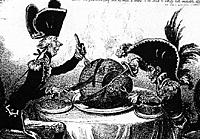 Regardless of the unique and often enlightening interpretations Bainbridge gives to this body of poetry, the book is important for a more fundamental reason. For whether the reader agrees or disagrees with the author's reading of specific poems matters little. What matters is how the author has succeeded in showing how the figure of Napoleon impacted not only on the governments and states of the time, but also the great creative minds of the time. No poem or book--or any work of art, for that matter--is autonomous. Every work of art is part of a greater whole. And that is why the "who", "when" and "why" of any poem is always important, and why Bainbridge's book, regardless of scholarly approach, might be read by any one interested in widening their understanding of Napoleon's life and times.
Regardless of the unique and often enlightening interpretations Bainbridge gives to this body of poetry, the book is important for a more fundamental reason. For whether the reader agrees or disagrees with the author's reading of specific poems matters little. What matters is how the author has succeeded in showing how the figure of Napoleon impacted not only on the governments and states of the time, but also the great creative minds of the time. No poem or book--or any work of art, for that matter--is autonomous. Every work of art is part of a greater whole. And that is why the "who", "when" and "why" of any poem is always important, and why Bainbridge's book, regardless of scholarly approach, might be read by any one interested in widening their understanding of Napoleon's life and times.
More Book Reviews:
Back to Table of Contents -- Napoleon #8
Back to Napoleon List of Issues
Back to MagWeb Master Magazine List
© Copyright 1997 by Emperor's Press.
This article appears in MagWeb (Magazine Web) on the Internet World Wide Web.
The full text and graphics from other military history magazines and gaming magazines are available at http://www.magweb.com